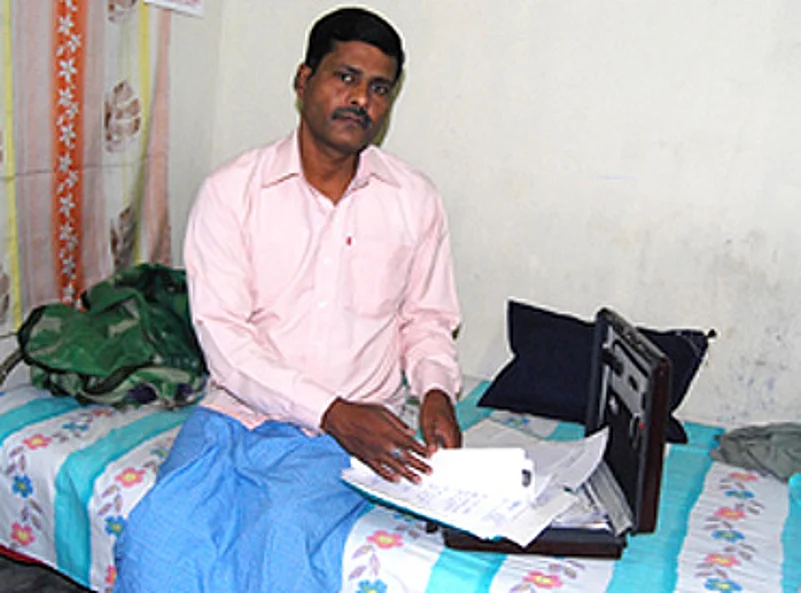- Most information commissioners are ex-bureaucrats
- Two ex-secretaries of the ministry of personnel, which oversees implementation of RTI, have appointed themselves as commissioners soon after retirement
- There have been no criteria laid down for the pattern of work allocation of commissioners
- In nearly four years, only 150 penalties imposed on erring babus, totalling Rs 22.79 lakh. Only Rs 7 lakh actually recovered so far.
- RTI applicants intimidated, even thrown into jail on trumped-up charges
***

Like Sah and Dev, Shiv Prasad Rai from Buxar went to jail for 29 days on the orders of the same district magistrate he had asked questions to. Rai had sought details of the status of loans disbursed from 60 nationalised banks in the district under the various schemes for farmers. After the authorities failed to comply with the 30-day deadline, he appealed to the first and second appellate authorities and the state information commission finally passed an order penalising the DM. "I was called to his office and asked to sign eight pages stating that I was satisfied with the information provided on February 1, 2008. But the state information commission had already imposed a penalty on the DM so I refused to sign his papers. They immediately slapped cases against me on the same day alleging extortion."
Rai was arrested and placed in judicial custody but he continued with his inquiries and unearthed bogus recipients of loans meant for farmers. Despite a stint in jail, Rai has refused to give up and continues his investigations.
Tracking these cases of harassment is social activist Praveen Amanullah, who, incidentally, is also married to the state's home secretary. She is also the convenor of the Bihar RTI Manch which organises RTI campaigns every two months. "The state has done little to create awareness on RTI and even voluntary disclosures under section four of the RTI act have not been done," she says. She also got a taste of bureaucratic apathy when the Patna Medical College refused to provide information on the care and quality of treatment given to patients. "They did not respond...simply assured us that improvements would be made."
Chief information commissioner Wajahat Habibullah expresses his inability to deal with cases of harassment of applicants by public authorities (see interview). "The state commissions can only ensure that the information is given to the applicant according to the provisions of the RTI Act. But our hands are tied as far as harassment goes because it is up to the state to provide relief."
Perhaps a key reason for the low number of penalties is the fact that the majority of information commissioners are former bureaucrats who view the commission as a post-retirement benefit. Bihar is no exception to the trend. CIC Habibullah himself was secretary for consumer affairs and panchayati raj before being picked for the top job. His room, adorned by pictures of the Nehru-Gandhi family, might raise eyebrows on why and how he was chosen. To be fair, Habibullah has also received accolades for steering the commission and pushing the boundaries to ensure greater transparency.
Consider also A.N. Tiwari, who was secretary, ministry of personnel and public grievance, in whose time the RTI Act was passed by Parliament. While activists allege that he was personally opposed to the Act, Tiwari quickly ensured that he was appointed as an information commissioner, which, incidentally, was facilitated by the same ministry the day he retired. One of his successors, Satyanand Mishra, also became an information commissioner after he retired as secretary of the same ministry.
Shekhar Singh, convenor of the national people's right to information campaign, says, "Our stand is that the appointment of information commissioners has to be transparent. It is unethical when someone who deals with the appointment appoints himself as an information commissioner on retirement."
As cases continue to pile up at the CIC, there seems to be little or no logic to the work being allocated to each commissioner. In the absence of any clear guidelines, Habibullah seems to have arbitrarily allocated work to his fellow commissioners. A series of file notings on the allocation of work—inspected by Outlook under the RTI—bears testimony to this fact. With bureaucrats sitting in judgement of fellow bureaucrats, the RTI has strangely now morphed into a bailout mechanism for corrupt bureaucrats.






















